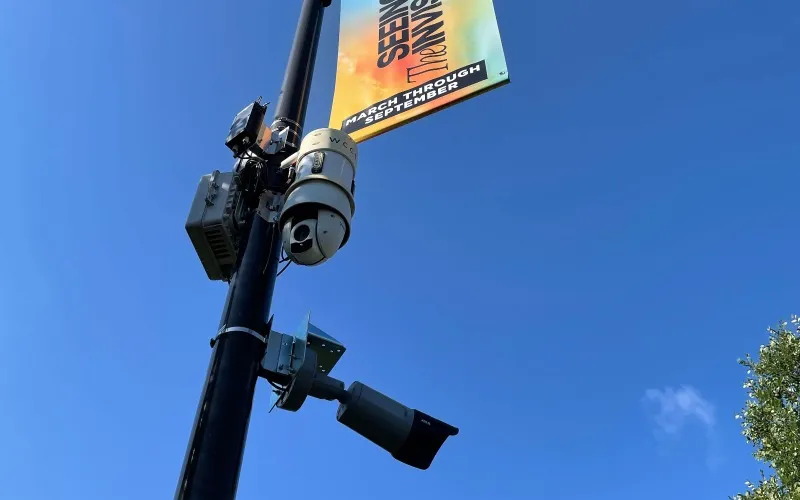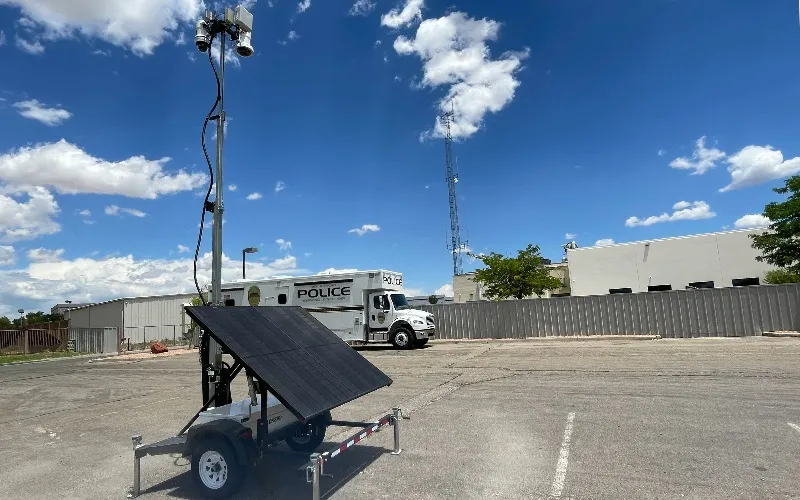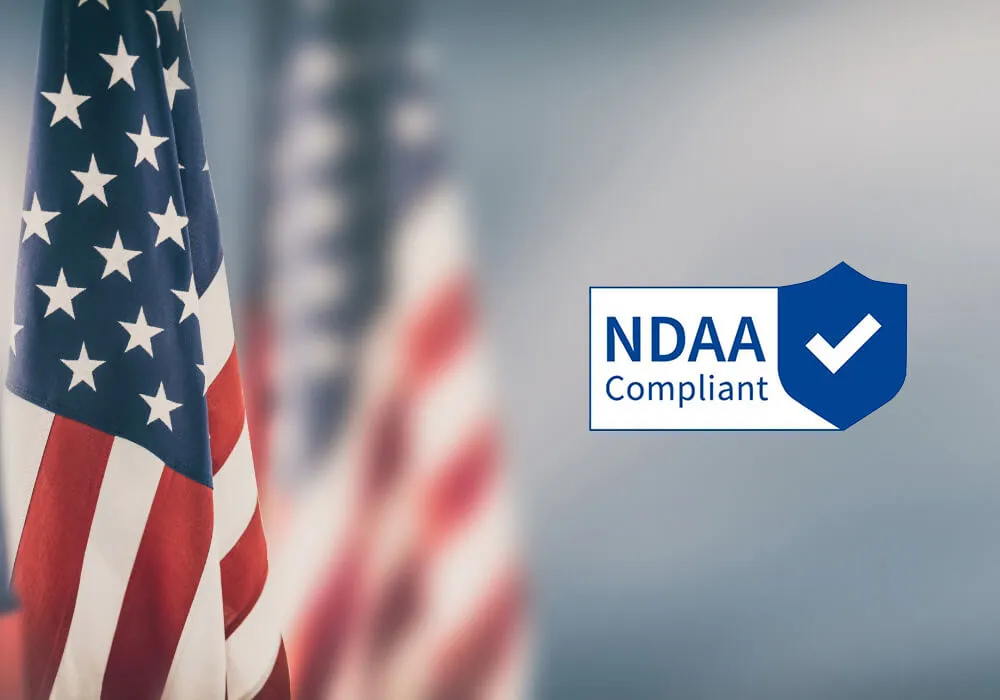WCCTV explores the National Defense Authorization Act (NDAA), the benefits of NDAA compliance, why it matters, and which organizations must prioritize using NDAA-compliant security cameras.
Exploring NDAA-Compliant Security Cameras
If you have even a passing interest in video surveillance cameras, you've likely encountered the term 'NDAA-compliant.'
It may be that you're considering upgrading your surveillance equipment and want to know what NDAA compliance means, what it regulates, and, perhaps most importantly, how it affects you.
From the outset, it's important to know that not all surveillance cameras are created equally, and if you work for a federal agency or any Law Enforcement and you want to do business with one, you must take specific care when choosing which surveillance equipment you utilize.
Research is the key to ensuring that you understand the key features of video surveillance equipment and that you stay on the right side of this new legislation.
To assist, WCCTV answers some of the most common questions about NDAA-compliant cameras below.
What Does NDAA-Compliant Mean?
NDAA compliance refers to adhering to the requirements of the National Defense Authorization Act (NDAA), specifically Section 889 of the 2019 Act, which restricts the procurement of video surveillance equipment from certain Chinese companies.
Therefore, an NDAA-compliant camera is one that is not manufactured by any of the named Chinese manufacturers prohibited under Section 889.
The purpose of this legislation is to prevent potential security vulnerabilities associated with surveillance equipment and ensure that devices used by federal agencies are as secure as possible.

What are the Benefits of Using NDAA-Compliant Cameras?
The main benefit of NDAA-Compliant cameras is that they are approved for use by federal agencies and those who receive federal funding.
Although the federal government does not set out an official certification process for NDAA compliance, many manufacturers self-verify their cameras through security and vulnerability testing and verification of their supply chains.
This, in turn, can lead to additional performance and security benefits, including:
Security and Compliance
One of the key benefits of using an NDAA-complaint camera is that they do not compromise national security.
The manufacturers of self-certified NDAA-Compliant cameras may perform testing to mitigate the risk of unauthorized access and protect sensitive data from potential breaches, meaning they are safe for deployment by government agencies or critical infrastructure facilities.
Reliability and Performance
NDAA-Compliant security cameras are typically provided by reputable manufacturers and often produced to the highest standards, meaning fewer failures, reduced maintenance costs, and more consistent performance.
This level of performance is often essential when considering the deployment scenarios for government agencies and critical infrastructure sites.
Who Should Use NDAA-Compliant Cameras?
One of the first questions people have when exploring NDAA-compliant cameras is - do I need to replace my cameras?
It's important at this stage to draw a clear distinction between organizations that 'should' use NDAA-compliant cameras and those who 'must' use them.
In our opinion, everyone who cares about the integrity, reliability, and security of their surveillance cameras should always opt for NDAA-compliant cameras.
Regarding who must use them, the National Defense Authorization Act (NDAA) bans the use of specific technology brands for federal agencies and any entity that receives federal funding.
This could include:
- Federal/State/Local agencies
- National Park Services
- Military
- Law enforcement
- Fire departments
- Hospitals
- Schools
- Jails/Prisons
- Public Utilities
Critical infrastructure locations that are federally owned or funded are also included. This includes dams, nuclear reactors, water and wastewater facilities, and others.
However, as mentioned above, the act also prevents federal agencies from procuring or even doing business with contractors who use banned equipment.
Therefore, even if you are a non-federal agency, you may still need to update your surveillance cameras. This could apply, for example, to construction businesses working on government contracts or sites where they need to have stringent Jobsite Security.

How Can I Check if My Cameras are NDAA-Compliant?
If you are concerned you are using non-compliant cameras, the first step is to identify the make, model, and manufacturer of your surveillance equipment.
If you still have the original documentation for your equipment, you may be able to contact the manufacturer to check compliance or verify this via their website.
You can also cross-reference against NDAA Section 899 where the names of all the banned manufacturers will be listed.
Lastly, contact a security industry association such as ASIS or SIA if you still have questions or uncertainties.
What Should I Do if My Cameras Are Not NDAA-Compliant?
If you discover you are using non-compliant technology, your first step should be to familiarize yourself with the specific requirements and restrictions of the NDAA and ascertain whether they directly impact you.
As stated previously, if you are a federal agency, receive federal funding, or work directly on federal projects, then you will need to plan to replace any non-compliant surveillance equipment.
Before replacing the equipment, you may still wish to speak to a security industry association such as ASIS or the SIA for assistance with understanding the potential risks and impacts of using non-compliant technology - and the potential dangers they may pose.
If you decide that you either need or want to replace the non-compliant surveillance equipment, then ensure you thoroughly research which camera solutions are compliant before purchasing any new equipment.
WCCTV's Use of NDAA-Compliant Surveillance Cameras
At WCCTV, we manufacture high-quality rapid-deployment pole cameras and solar surveillance trailers in the USA.
As part of our ongoing commitment to our government and commercial client base, we do not use camera suppliers listed in NDAA section 899, and only use cameras that have been self-verified as NDAA-Compliant.
This allows federal agencies and other government officials to purchase via official channels such as the GSA Schedule, and they can be used with complete confidence by our government and critical infrastructure clients.
Our ongoing commitment to security, integrity, and quality is why our mobile video surveillance cameras continue to be the preferred choice for government safety and security applications.
FAQs About NDAA-Complaint Surveillance Cameras
What Makes a Camera NDAA-Compliant?
NDAA-compliant cameras do not use components from manufacturers that are prohibited under section 899 of the NDAA.
Why is it Important to use NDAA-Compliant Security Cameras?
NDAA compliance ensures that the cameras utilized by federal agencies and those who work with them do not pose a risk to national security and jeopardize the safety of critical infrastructure.
Are NDAA-Compliant Cameras More Expensive?
NDAA-compliant cameras may be more expensive due to their higher security standards, manufacturing quality, and other factors. Any increased costs are offset by the reassurance of enhanced security and legal compliance.
Is There an Official Certification Process for NDAA Compliant Cameras?
No officially recognized or defined certification process exists for NDAA Compliance. Camera solutions that are described as NDAA-Compliant are typically those that do not feature any cameras or components from companies that are blacklisted with Section 889 of NDAA. The term NDAA-Certification may be a misleading or misused term.
Is There an Official NDAA-Compliance Logo or Badge
There are no federally recognized or official NDAA-Compliant logos, badges, or certificates.



